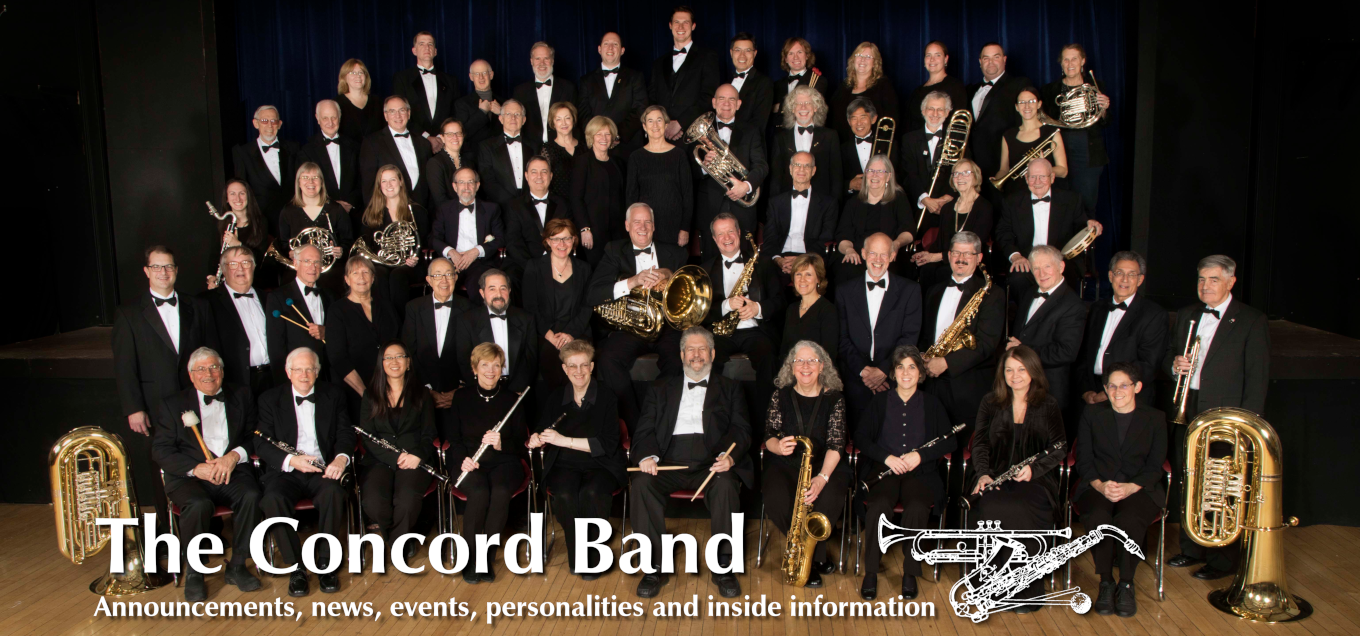Join the Concord Band as we begin our 55th season with our annual Fall Concert, presented at the Performing Arts Center at 51 Walden Street in Concord, on Saturday, October 26, 2013, at 8:00 PM. Our concert theme, "By Request," features music composed for symphonic band requested by Concord Band members, and showcases tuba soloist and Concord Band member, Dr Chi-Sun Chan. The program includes music written by American and international composers and represents a wide variety of musical styles and genres.
Esprit de Corps by Robert Jager was commissioned by the United States Marine Corps Band, Colonel John R. Bourgeois, conductor. The march is based on “The Marines Hymn” and is a tribute to the Marine Band and the Corps. It is a lively and superbly-crafted march: dramatic, solemn,
inspirational and fast! The tempo marking is “Tempo di Bourgeois” by which the composer means “very bright”.
British composer Gordon Jacob holds a unique and special place among early writers for wind band. An Original Suite was his first composition for band, completed in 1928. The three movement Suite (March, Intermezzo, Finale) draws on original folksong material and is specifically written for
military band, an instrumental distinction separating the concert band from the traditional and ever-popular British brass band.
Composer Rodney Newton has scored music for films and TV, and was Music Consultant to the London Film School for 21 years. His Capriccio for Tuba and Band is a luscious composition in the romantic style, featuring the lyric and technical virtuosity of the tuba. The instrument was a late
arrival to the symphony orchestra and familiar solo repertoire (i.e. solos for violin, clarinet, cello, etc.). Tubist Dr Chi-Sun Chan will be the featured soloist in this masterful and emotional work.
Johan de Meij’s five-movement Symphony no. 1, The Lord of the Rings, first prize winner of the 1989 Sudler International Composition Competition, instantly became a staple in the contemporary wind band literature. The first movement, Gandalf (The Wizard), a musical portrait of the principal figure in the legend, includes an allegro vivace section, which aptly captures a vivacious ride on his horse, Shadowfax.
Unique among the many marches penned by John Philip Sousa, his 1923 Nobles of the Mystic Shrine (his only march with a part for harp) was written at the request of his nephew and sponsor, A. R. Varela, immediately after Sousa became a member of the Ancient Arabic Order of Nobles of the Mystic Shrine. Sousa was named the first honorary director of the Almas Temple Shrine Band in Washington during the same period.
The music of New England composer and University of Rhode Island Professor, Roger Cichy, has become a favorite of the Concord Band. His Flowing Pens From Concord was commissioned by the Band specifically for the 50th anniversary celebration gala concert in 2009. Among his many compositions for band, Cichy describes Quartets as “a unique work exposing a multitude of
quartets that exist within the full ensemble”. Containing twenty “quartet” moments, the work exploits the instrumental timbres of traditional quartets, which weave in and out of the musical textures. At times the work begins to have a real jazz feel, with the rhythmic lines contrasting with beautiful soaring lyricism and sonorities.
Eric Whitacre is an accomplished composer and major figure in contemporary music, receiving awards from ASCAP and the Amer. Choral Directors Assoc., and honored with a Grammy nomination in the contemporary classical composer category. October was commissioned by the Nebraska Wind Consortium, consisting of more than twenty-five high schools, colleges and universities throughout the midwest. Inspired by the music of great English composers Vaughan Williams and Elgar, the work captures the essence and mood of a crisp October day, with its beautifully natural harmonic language and flavor of the changing season.
In Clifton Williams’ Symphonic Dance No. 3, subtitled "Fiesta", the composer displays a musical kaleidoscope of Latin “street bands, bull fights, and bright costumes” (Robert E. Restemyer).
— Program Notes edited by Music Director James O'Dell

